
Traumatology
Scope & Guideline
Exploring the Depths of Trauma Research and Practice.
Introduction
Aims and Scopes
- Research on Trauma and Mental Health:
The journal emphasizes studies on the psychological impact of trauma, including posttraumatic stress disorder (PTSD) and associated mental health conditions. It seeks to understand the mechanisms of trauma and resilience among affected individuals. - Community and Social Support Interventions:
A significant focus is placed on the role of community and social support systems in mitigating trauma effects. Research often explores how social networks and community resources contribute to recovery and resilience. - Diverse Populations and Contexts:
The journal highlights research involving various populations, including refugees, veterans, and marginalized groups, examining how trauma experiences and responses vary across different contexts and cultures. - Innovative Treatment Approaches:
There is a consistent exploration of new treatment modalities for trauma-related conditions, including creative therapies, mindfulness practices, and other holistic approaches that address the psychological and emotional needs of trauma survivors. - Longitudinal and Cross-Sectional Studies:
The journal publishes both longitudinal studies that track trauma effects over time and cross-sectional studies that provide snapshots of trauma impacts and recovery processes in different populations.
Trending and Emerging
- Impact of COVID-19 on Mental Health:
Recent publications have highlighted the psychological effects of the COVID-19 pandemic, including increased PTSD symptoms, resilience factors, and the role of community support during crises. - Moral Injury and Its Implications:
There is a growing interest in the concept of moral injury, particularly among military personnel and healthcare workers, examining how ethical conflicts and moral dilemmas contribute to mental health issues. - Transgenerational Trauma:
Research exploring the transmission of trauma across generations is gaining prominence, with studies focusing on how trauma affects family dynamics and offspring's mental health. - Intersectionality in Trauma Research:
Emerging studies are increasingly addressing the intersection of various identities (e.g., race, gender, socioeconomic status) and their influence on trauma experiences and recovery pathways. - Community-Based Resilience Strategies:
There is a trend towards exploring community resilience and collective healing strategies, emphasizing the importance of social support systems in trauma recovery.
Declining or Waning
- Traditional Trauma Models:
Research strictly adhering to traditional models of trauma without integrating contemporary understandings of resilience and community support is becoming less prevalent. There is a shift towards more holistic and inclusive approaches. - Focus on Single Trauma Events:
Studies concentrating solely on the effects of a single traumatic event are waning. The journal now prioritizes research that examines cumulative trauma and the interplay of multiple traumatic experiences over time. - Narrow Demographic Studies:
Research that focuses narrowly on specific demographics without considering intersectionality or broader social contexts is declining. The journal is moving towards inclusive research that addresses diverse experiences across various populations. - Overemphasis on Quantitative Analysis:
There is a decreasing trend in the publication of purely quantitative studies. The journal is increasingly valuing qualitative research that captures the nuanced experiences of trauma survivors. - Traditional Psychotherapy Approaches:
The focus on conventional psychotherapy methods is declining, as the journal emphasizes innovative and integrative approaches that incorporate cultural and contextual factors in trauma treatment.
Similar Journals

STRESS AND HEALTH
Advancing insights at the crossroads of stress and health.STRESS AND HEALTH is a premier journal published by Wiley that serves as a vital platform for advancing knowledge in the intersection of psychology, medicine, and mental health. With its ISSN 1532-3005 and E-ISSN 1532-2998, the journal has established itself as a leading resource for researchers and practitioners focusing on the physiological and psychological impacts of stress and health outcomes. With a remarkable impact factor and classified in the prestigious Q1 quartile across categories such as Applied Psychology, Clinical Psychology, Medicine (miscellaneous), and Psychiatry and Mental Health, STRESS AND HEALTH publishes high-quality, peer-reviewed research that aims to explore innovative methodologies and evidence-based interventions. Offering both subscription and open access options, the journal is dedicated to disseminating critical insights and enhancing the understanding of stress and health dynamics. For over two decades, from 2001 to 2024, it has contributed significantly to the global discourse on health challenges, making it an essential reference for academics, clinicians, and students alike.

Neuropsychopharmacology Reports
Pioneering discoveries in the field of neuropsychopharmacology.Neuropsychopharmacology Reports is a leading open-access journal published by WILEY, dedicated to advancing the fields of clinical psychology, pharmacology, psychiatry, and mental health. Established in 2018, the journal aims to disseminate high-quality research findings, critical reviews, and innovative methodologies that elucidate the complexities of neuropsychopharmacology in enhancing mental health outcomes. With an impressive impact indicated by its Q2 rankings in several categories including Clinical Psychology and Pharmacology (medical) as of 2023, Neuropsychopharmacology Reports stands out as a vital resource for researchers, professionals, and students keen on exploring the interplay between pharmacological interventions and psychological well-being. The journal’s open-access nature ensures that critical advancements in this rapidly evolving field are readily available to a global audience, fostering collaboration and discourse among scholars and practitioners alike. Building on its indexed status with Scopus, the journal is positioned as a noteworthy contributor to ongoing discussions and developments in psychiatry and medical pharmacology.

BRITISH JOURNAL OF PSYCHIATRY
Unveiling Breakthroughs in Psychiatric ResearchBritish Journal of Psychiatry, published by Cambridge University Press, stands as a pivotal resource in the realm of mental health and psychiatry. With an impressive impact reflected in its Q1 classifications in both Medicine (miscellaneous) and Psychiatry and Mental Health, this esteemed journal ranks 23rd out of 567 in its field according to Scopus, achieving an exceptional 96th percentile. Since its inception in 1963, the journal has continued to push the boundaries of research and discourse, serving as a platform for groundbreaking studies that enhance our understanding of psychiatric conditions and promote effective therapeutic strategies. Though it does not operate with an open-access model, the British Journal of Psychiatry remains an essential publication for researchers, clinicians, and students alike, offering in-depth insights and innovative findings that are crucial for navigating the complexities of mental health.

Journal of Child & Adolescent Trauma
Advancing knowledge on trauma in young lives.The Journal of Child & Adolescent Trauma is a premier publication dedicated to advancing the understanding and treatment of trauma experienced by children and adolescents. Published by Springer Heidelberg, this journal serves as a vital resource for researchers, clinicians, and educators in the fields of pediatrics, psychology, and psychiatry. With an impressive Q1 ranking in Emergency Medicine and a Q2 ranking in Critical Care and Intensive Care Medicine for 2023, it is recognized for its high-impact contributions to the field, reflected in its Scopus rankings—#33 out of 109 in Emergency Medicine and #46 out of 110 in Critical Care. Through its commitment to publishing rigorous peer-reviewed articles, the journal aims to illuminate the complexities of trauma in young populations, fostering evidence-based practices and innovative interventions. With content available in both print and online formats, the Journal of Child & Adolescent Trauma is indispensable for professionals seeking to enhance their understanding and impact in this crucial area of study.
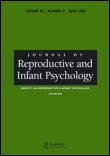
JOURNAL OF REPRODUCTIVE AND INFANT PSYCHOLOGY
Pioneering Research at the Frontier of Reproductive and Infant PsychologyWelcome to the Journal of Reproductive and Infant Psychology, a leading academic publication dedicated to the understanding of psychological aspects related to reproductive health and infant development. Published by Routledge Journals, Taylor & Francis Ltd in the United Kingdom, this journal holds significant prominence in its field, featuring an impressive range of interdisciplinary research that spans obstetrics, gynecology, pediatrics, and psychology. With a robust record of impactful scholarship since its inception in 1983, it serves as an essential resource for researchers and professionals committed to advancing knowledge and practice in reproductive medicine and infant psychological health. The journal consistently ranks in the upper quartiles across various categories, including a prestigious Q1 in Pediatrics, Perinatology, and Child Health, demonstrating its influence and quality of research. Although it currently does not offer Open Access, its advanced subscription and institutional access options ensure that vital findings reach a wide audience. As we look toward 2024 and beyond, the Journal of Reproductive and Infant Psychology is poised to continue shaping the dialogue in these critical areas of study, making it an invaluable asset for students and scholars alike.
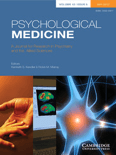
PSYCHOLOGICAL MEDICINE
Shaping the future of psychological and medical understanding.PSYCHOLOGICAL MEDICINE is a leading journal in the field of psychiatry and psychology, published by Cambridge University Press. With its ISSN 0033-2917 and E-ISSN 1469-8978, this journal has firmly established itself as a premier platform for cutting-edge research since its inception in 1970. It consistently ranks in the top quartile for both Applied Psychology and Psychiatry and Mental Health, reflecting its exceptional impact in the field, with a 2023 Scopus ranking of #36 out of 567 in Psychiatry and Mental Health, and #21 out of 249 in Applied Psychology. The journal aims to publish comprehensive studies that explore the interplay between psychological phenomena and medical health, contributing vital insights that advance both theoretical understanding and clinical practice. Although it is not an Open Access journal, PSYCHOLOGICAL MEDICINE remains a vital resource for researchers, professionals, and students committed to the scientific investigation of mental health issues.
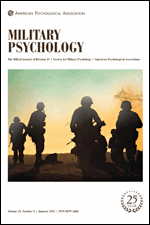
MILITARY PSYCHOLOGY
Bridging research and practice in military settings.MILITARY PSYCHOLOGY is a premier journal dedicated to advancing the understanding of psychological principles as they apply to military settings and contexts. Published by ROUTLEDGE JOURNALS, TAYLOR & FRANCIS LTD, this esteemed journal has been at the forefront of military psychological research since its inception in 1990. With an ISSN of 0899-5605 and E-ISSN 1532-7876, it serves as a valuable resource for researchers, professionals, and students alike. The journal is classified in the Q3 quartile for both Experimental and Cognitive Psychology and Psychology (miscellaneous) in 2023, highlighting its significance in the broader psychological landscape. Additionally, it holds a commendable ranking within the social sciences, underscoring its relevance and influence in understanding psychological dynamics within military environments. Although it currently does not offer open access, the journal provides a wealth of insights into critical topics such as stress and resilience, operational effectiveness, and the mental well-being of service personnel, making it an essential read for anyone engaged in this pivotal field of study.
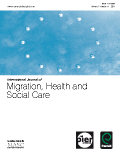
International Journal of Migration Health and Social Care
Exploring the nexus of migration, health, and social care.International Journal of Migration Health and Social Care is a leading academic journal published by Emerald Group Publishing Ltd, dedicated to advancing the understanding of migration, health, and social care dynamics. With its ISSN 1747-9894 and E-ISSN 2042-8650, this journal has been a significant platform for interdisciplinary research since its inception in 2005. Situated in the United Kingdom, it serves as a vital resource for researchers and professionals grappling with complex issues at the intersection of health, law, sociology, and political science. The journal is recognized within Category Quartiles, ranking Q3 in Health (Social Science) and Q2 in both Law and Sociology & Political Science for 2023. Its Scopus ranks further highlight its reputable standing: #388 in Social Sciences (Law) and #727 in Social Sciences (Sociology and Political Science). Although it does not offer Open Access, the International Journal of Migration Health and Social Care is instrumental in fostering academic dialogue and innovation, making it essential reading for those seeking to inform policy and practice in these critical fields of study.
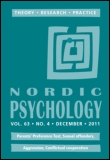
Nordic Psychology
Exploring Nordic Insights in Psychological ScienceNordic Psychology is a distinguished journal published by Routledge Journals, Taylor & Francis Ltd, dedicated to advancing the field of psychology with a focus on Nordic perspectives and methodologies. With an ISSN of 1901-2276 and an E-ISSN of 1904-0016, this journal has been a key resource for researchers, professionals, and students since its inception in 2006. As of 2023, it holds a respectable Q3 ranking in miscellaneous psychology, reflecting its tangible contributions to the academic community, evidenced by its rank of 123 out of 216 in general psychology on Scopus. The journal aims to foster interdisciplinary dialogue and present innovative research that addresses contemporary psychological issues, particularly those that resonate within the Nordic context. With open access options available, readers can freely engage with cutting-edge studies that bridge theoretical exploration and practical application. By showcasing diverse methodologies and perspectives, Nordic Psychology aspires to enhance the global discourse in psychology, making it an essential read for those invested in the evolution of psychological science.
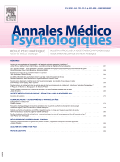
ANNALES MEDICO-PSYCHOLOGIQUES
Pioneering Research in the Art and Science of PsychologyANNALES MEDICO-PSYCHOLOGIQUES is a distinguished academic journal published by MASSON EDITEUR, focusing on the fields of applied psychology, psychiatry, and related arts and humanities. With its ISSN 0003-4487 and E-ISSN 1769-6631, this journal has been a pivotal platform for researchers since its inception in 1946, contributing valuable insights into the intersection of psychological theory and medical practice. Over the years, it has maintained a significant standing with a Q3 ranking in Applied Psychology and Q2 in Arts and Humanities (Miscellaneous), showcasing its commitment to high-quality research and scholarship. Although it does not operate under an open-access model, the journal remains accessible to researchers and practitioners alike, promoting the dissemination of critical knowledge in mental health and psychological sciences. As evidenced by its Scopus rankings, ANNALES MEDICO-PSYCHOLOGIQUES is recognized for its contributions within the academic community, making it an essential resource for professionals and students aiming to excel in these dynamic fields.